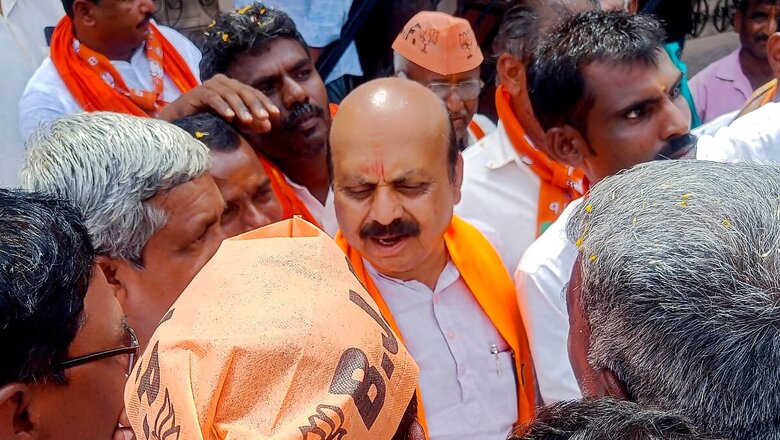
views
Anti-incumbency has been a dominating factor in the Karnataka assembly elections since 1985 with no government and chief minister retaining office in a subsequent poll. The Bharatiya Janata Party, thus, was already on a weak wicket. It was further hampered by a lack of clear direction, party faction fights, and the installation of a purported feeble CM in Basavaraj Bommai, according to many critics.
Age and ill health were quoted as the main factors behind BS Yediyurappa’s resignation from the chief minister’s post in 2021 but the then CM was also questioned for his working style, with some in the party raising doubts about his leadership. One of the main reasons behind Yediyurappa leaving the chair was the fact that party infighting was at its peak.
Bommai, who replaced him, was considered his man, working under his shadow. He could not control the problems BJP Karnataka was facing. Corruption, infighting, and reputation management remained issues that ultimately reflected in the party’s poor performance in the assembly polls.
The Congress put up a concerted campaign to highlight its allegations of corruption. Along with rallies and roadshows, it launched a website on alleged corrupt practices of Bommai’s government that echoed well on the ground. The website https://www.40percentsarkara.com says so far 5,34,642 voices have raised their complaints against the BJP government’s corrupt practices. The efforts by Siddaramaiah, DK Shivakumar, and G Parameshwara found support in Rahul Gandhi’s road journey of 500 kilometres in 24 days, passing through eight districts in September-October 2022 under his Bharat Jodo Yatra.
BJP pinned its hopes on former CM Yediyurappa but failed to create a counter-narrative against Congress’ allegations and four years of anti-incumbency against its government.
The BJP has always relied on Lingayat votes in the state. This time, it tried to add Vokkaliga support too to its vote base, with the Bommai-led government increasing caste-based reservation for them and the party launching an intense wave of campaigning in the Vokkaliga community-dominated Old Mysuru region.
The outcome shows neither community backed the BJP in this election. While Lingayats have traditionally been BJP supporters, Vokkaliga votes have been divided between the Congress and JD(S).
The BJP saw a series of Lingayat leaders leaving the party, led by former CM Jagadish Shettar and former deputy CM Laxman Savadi. Both joined the Congress. On caste-based reservation issues, Panchamasali Lingayats, who constitute about 60% of the Lingayat population in Karnataka, were not happy with the changes made and were demanding that the BJP government come up with a higher 15% reservation category and they held protests for it.
The counting data shows the BJP lost the Lingayat community’s votes significantly and failed to draw the Vokkaliga people. And the BJP’s loss here became the Congress’s gain.
The state has 67 Lingayat-dominated seats. In 2018, the BJP won 40 of them. This year, the tally was about halved. The Congress won 42 seats, an addition of 22 to its previous number.
Out of the 38 Vokkaliga-dominated seats, the BJP won nine, equalling its 2018 tally. The Congress bagged 19 seats, an addition of 11 to its 2018 catch. The Congress, through DK Shivakumar who is considered a tall Vokkaliga leader and CM contender, has made a significant dent in the Janata Dal (Secular)’s votes. The party led by HD Kumaraswamy won just nine of these seats, which means a loss of 12 seats from its tally in 2018.
Vokkaliga community members preferred to go with a larger party this time that had a CM aspirant from the community in Shivakumar. The JD(S) is a much smaller party, limited to the Old Mysuru region, and plays the role of kingmaker in case of a hung assembly scenario.
The Congress tried to add Lingayat and Vokkaliga votes to its “OBC + Dalits + Minorities” strategy and it worked well, the outcome shows, even if Jagadish Shettar lost while contesting on its ticket. Along with Shivakumar, the party has another tall OBC face as its leader. Siddaramaiah, chief minister from 2013 to 2018, comes from the Kuruba caste which forms 7% of Karnataka’s population.

















Comments
0 comment